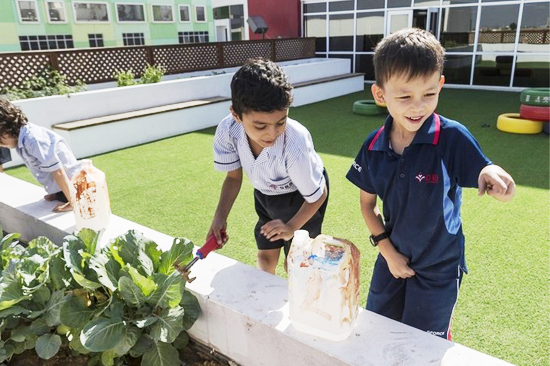DUBAI // Schoolchildren across the emirate are learning how to nurture plants and vegetables by applying what they are taught in the classroom.
Growing everything from potatoes and marrow to tomatoes and cabbage, pupils in dozens of schools are finding out how the science on the blackboard can be used in the real world.
And with much of what is grown going back to the school dinner hall, they are also developing a taste for healthy eating.
Following the example of similar projects in the US and UK, the Knowledge and Human Development Authority last year encouraged schools to create their own gardens.
"It provides many opportunities to illustrate science, mathematics, technology, languages, art and design, history, geography, music and all the soft skills," said Judith Finnemore, of Focal Point Management Consultancy.
"Growing plants teaches resilience and patience because plants take time, care and attention to develop into fully fledged entities."
This kind of activity can help to enhance an existing curriculum.
"It is particularly suitable for children who experience academic difficulties because it provides something at which they can be as successful as their peers," she said.
Her work with the Phoenix School Farm in London, which created its own garden, led to academic improvements.
"In geography, senior students were able to assess how different clay-humus complexes affected plant growth; in mathematics, a knot garden provided an opportunity to look at symmetry and tessellation; science looked at the impact of various agricultural chemicals on plant growth," Ms Finnemore said. But schools need to introduce gardens with a clear plan.
"Unless the garden is cared for all year round, schools will return to some seriously affected plants and some disappointed children," she said.
Schools can link up with local garden groups who can provide guidance to schools and help out during holidays and weekends.
"Starting a garden needs real investment in time – for planning in advance – and some community volunteers to work with the children doing this planning will be invaluable," Ms Finnemore said.
"They need to decide what will be grown and what is the intention for anything produced. For example, if food is grown, where will it go?"
Gardens tend to fail when there is no overall plan and no one is in control of the process. The gardens’ cost can be offset by attracting sponsors to ease the burden on school budgets, she said.
The KHDA says 58 private schools in the emirate now have gardens. Schools are growing on school land or using planters, recycled containers, vertical planters, hydroponic towers or tables.
Some schools in Dubai have started making their own compost, harvesting their own produce for consumption in the school canteen, or for dedicated cooking activities linked to the curriculum.
Heather Mann, principal of Dubai British School Jumeirah Park, said their garden was now in its second year.
"[We want] to support the students’ learning related to the requirements of the English National Curriculum, and also to make better use of an unused space," she said.
"The garden will in time be a tranquil place for students and staff to use as part of wellbeing."
Each year group in the primary school has a unit of study related to the garden or growing. For example, Year 3 pupils have a theme titled English Country Garden.
The school runs an after-school gardening club and staff and pupils decide what to grow. The garden, which has a mix of flowering plants and vegetables, is looked after on a weekly basis.
"The children learn about plants including a great deal of learning related to healthy eating by growing vegetables," said Ms Mann. "In addition to the educational links, in the cooler months we have used the garden as a meeting place, which provides a more relaxed and welcoming environment.
"The children have cooked with some of the produce but mainly we have donated the produce to ancillary staff so that they may have a more healthy diet."
This email address is being protected from spambots. You need JavaScript enabled to view it.
